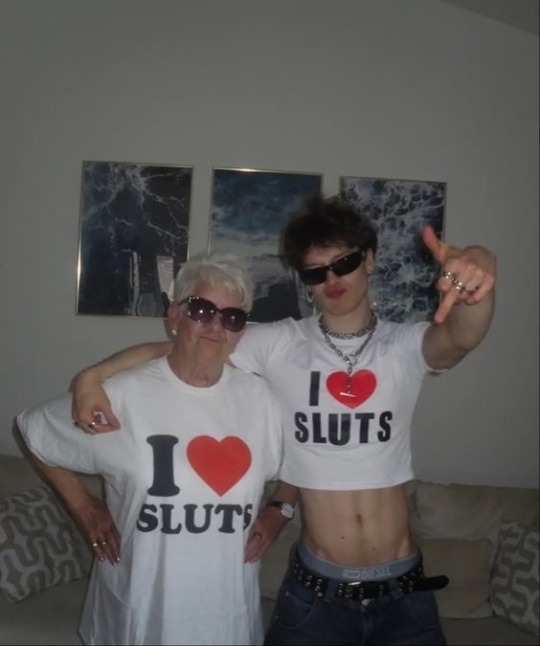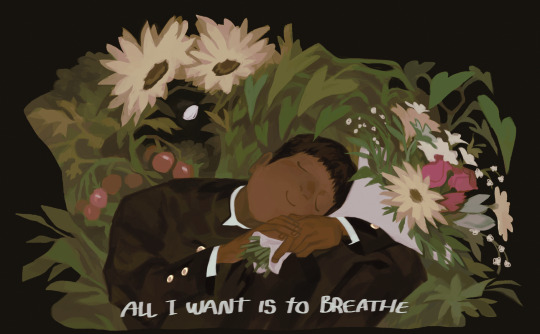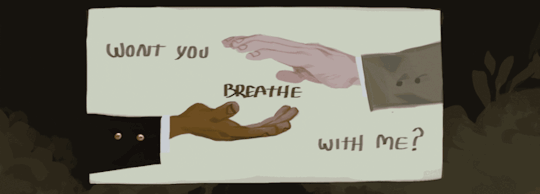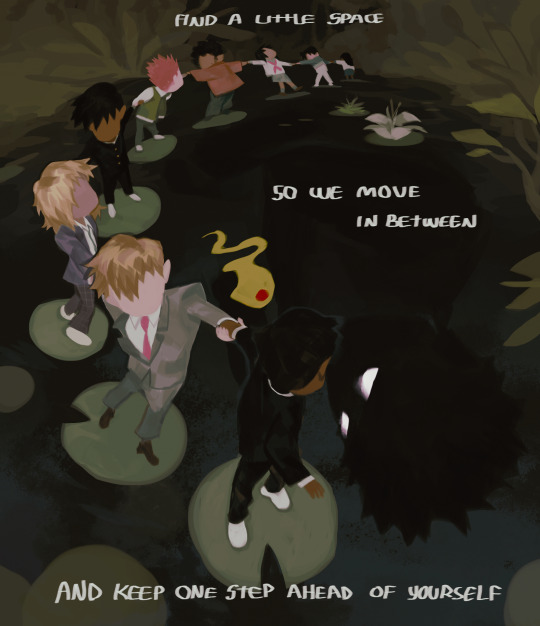Text
okay americans i gotta ask because as an European i grew up with lots of american shows and cartoons and in a lot of them there was an episode where they give the protags a doll or an egg or a bag of flour or whatever and told them pretend to be its parents or something
#i had a class where we had to empty an egg and then carry it with us for i think a week?#lots of kids cracked theirs like immediately#this was in highschool btw#once the week was over i chucked my child out the bus window
3K notes
·
View notes
Note
Derin, I love your writing so much!
I am so glad that we have made it off the totally normal space ship onto a totally normal planet and that everything is going so well!
From now on, everything will be super fine and normal!
237 notes
·
View notes
Text
take figures out of their boxes btw. sew patches on your favorite jacket. go to bed with your favorite plushes. wear the pants you usually save for special occasions. draw something cool on your wall. put a sticker on your laptop. dye your hair and pierce your lips. glass is meant to break, metal is meant to rust. items are meant to be used. that's how the world knows that somebody loved them.
120K notes
·
View notes
Note
What is your opinion on terf blocklists, where every one on there at the time had clear and intentional radfem beliefs pushing shitty ideas about trans people and easily identifiable as to what exactly they believe via what they say and circulate and who they constantly reblog shitty things about trans people from?
I promise this is a genuine good faith question; I want to understand if the thing I've been taught be others to do with the purported intention of eliminating platforms for terfs to protect ourselves and others is actually helpful or if that also has far reaching consequences I hadn't considered before. I'm trying to think about it but struggling with the idea I got taught to do them/follow them (blocklists) for being to identify correctly and block, not harass. But do the harms of encouraging that approach actually outweigh the benefits and that doesn't change even if the blocklist is for actual bigots?
Again, genuine question. Trying to learn.
I think the problem here is less in how a blocklist is constructed; it's not hard to imagine that a list can be made under strict enough criteria, with enough careful vetting, to contain only Genuinely Bad People- or at least people who would not object to being placed in the category of that list. It's also not hard to come up with categories of people that feel morally reprehensible enough, and unattached from any marginalized identity enough, to be "safe" to target: it would be absurd to argue against a "Nazi blocklist" that contains only self-proclaimed Nazis.
The problem also isn't really in how blocklists are intended to be used; it's pretty fair that someone might want a list of people to block pre-emptively in order to avoid harassment, particularly when that harassment is bigoted. It's not hard to imagine that someone making such a list is doing so with the intent that it only be used for blocking, and that they might even make an effort to say as much in the post. And at that point, is it really their fault if someone goes against their clearly-stated wishes?
The problem is that a blocklist is, by fundamental design, "free research". It's put forth entirely so other people do not have to do their own research, which means the entire premise discourages people from doing that research.
You aren't offering up a list of people that others should go look into and form their own opinion about, you're offering up a list of people you already did the research on so people can copy/paste and be done with it. It would be counterproductive- and frankly silly- to post a blocklist with some "but make sure to double check these yourself!" disclaimer, because like, that's not the point of the list. Nobody is going to do that. Even if they did, they're looking into these people under the assumption that there is something to find; everything is going to look suspicious in a way it never would have without that framing.
The question isn't whether a blocklist can be made with good intentions and due diligence; the question is whether it can be made with ill intent or sloppy execution, whether anyone can tell the difference, how likely they are to actually check, what you're doing with that list, and what impact your choices have.
If I make a list, the message I send is, "you can trust me. I did the research, I did it right, and this is a Good Blocklist. If you trust me, you should trust this list."
If I reblog a blocklist, the message I send is, "I trust this list. I may have even checked it myself. This is a Good Blocklist. If you trust me, you should trust this list."
The majority of the people who follow me probably believe they can trust me to some extent; oftentimes, people just trust that whatever is on their dashboard is trustworthy, because someone they follow put it there. Those are their friends, and their friends are trustworthy!
This should make you nervous. You should not be comfortable with this. People make mistakes all the time, and even if they did do the research (it's so much more likely that they did not, especially if they're not the original creator), someone else's standards of what kind of person "deserves" to be on a list like that are very likely different from your's. Are you going to double check every single name on that list yourself?
Well, if the accusation is bad enough, probably not. Especially if the accusation is something like "Nazi" or "TERF". And if you do start checking, how likely are you to check every single name? If the first 3 or 5 seem to check out, will you bother with the other 50 on the list?
What if OP hid someone in that list who doesn't belong there; someone they just have a personal grudge against? What if OP defines "TERF" to mean "anyone I assume doesn't think trans women are the most oppressed", and after the first 15 actual TERFs, the list is just a bunch of transmascs- many of whom don't even disagree with OP in the first place? What if they define "TERF" to include anyone who has ever been a TERF, and one of the people on that list is a trans person that has been rumored- without any foundation or grain of truth whatsoever- to have once been a TERF?
Will you know? Will you check? Even if someone you trust reblogs it? Even if someone you trust made it?
A blocklist may not have the same kind of obviously punitive intent as a callout post does, but it's a tool from the same toolbox. People think callout posts are about "safety", too. Lots of people also think that about the criminal justice system, about prisons, about the death penalty.
The question is not whether that could be true, or whether there could be a world in which justice is administered correctly with these tools. The question is whether it could fail, and who it hurts when it does.
Who can abuse this system? How easy is it to do so? Who is most likely to be hurt; is it the intended target, or people who are already disempowered by our systems and society?
What is the best way to go about this?
Even done correctly, a blocklist is not the most effective tool here: people can remake their blogs, change urls, and often have sockpuppets ready to go anyway. The list is rendered useless and inert as soon as enough people change their strategies to evade it. A more effective tool is education; teaching people how to recognize a TERF, or TERF ideology, on their own. Teaching them why those ideas are problematic. Encouraging them to block and disengage, and teaching them why engaging is harmful and counterproductive. Talking about de-radicalization, cult recruitment and radicalization tactics, and how to fight this epidemic.
Telling people what to think does not solve the problem, but teaching them how to be critical might.
56 notes
·
View notes
Text
Saddest thing ever is reading an academic paper about a threatened or declining species where you can tell the author is really trying to come up with ways the animal could hypothetically be useful to humans in a desperate attempt to get someone to care. Nobody gives a shit about the animals that “don’t affect” us and it seriously breaks my heart
155K notes
·
View notes
Text
Hey since I got one this morning I thought I'd make a post about it....
If someone that you don't know sends you an ask asking for money, it is very likely a scam! Common ones include "sick pets" or "I need money to evacuate (country)". These are scams, and they will not hesitate to play on your emotions. Stay safe out there and report them for phishing! Here's how to report content. Choose "unlawful uses or content" and then "phishing". Spread the word and please please be careful.
54 notes
·
View notes
Text
So what I’ve learned from the past couple months of being really loud about being a bi woman on Tumblr is: A lot of young/new LGBT+ people on this site do not understand that some of the stuff they’re saying comes across to other LGBT+ people as offensive, aggressive, or threatening. And when they actually find out the history and context, a lot of them go, “Oh my god, I’m so sorry, I never meant to say that.”
Like, “queer is a slur”: I get the impression that people saying this are like… oh, how I might react if I heard someone refer to all gay men as “f*gs”. Like, “Oh wow, that’s a super loaded word with a bunch of negative freight behind it, are you really sure you want to put that word on people who are still very raw and would be alarmed, upset, or offended if they heard you call them it, no matter what you intended?”
So they’re really surprised when self-described queers respond with a LOT of hostility to what feels like a well-intentioned reminder that some people might not like it.
That’s because there’s a history of “political lesbians”, like Sheila Jeffreys, who believe that no matter their sexual orientation, women should cut off all social contact with men, who are fundamentally evil, and only date the “correct” sex, which is other women. Political lesbians claim that relationships between women, especially ones that don’t contain lust, are fundamentally pure, good, and unproblematic. They therefore regard most of the LGBT community with deep suspicion, because its members are either way too into sex, into the wrong kind of sex, into sex with men, are men themselves, or somehow challenge the very definitions of sex and gender.
When “queer theory” arrived in the 1980s and 1990s as an organized attempt by many diverse LGBT+ people in academia to sit down and talk about the social oppressions they face, political lesbians like Jeffreys attacked it harshly, publishing articles like “The Queer Disappearance of Lesbians”, arguing that because queer theory said it was okay to be a man or stop being a man or want to have sex with a man, it was fundamentally evil and destructive. And this attitude has echoed through the years; many LGBT+ people have experience being harshly criticized by radical feminists because being anything but a cis “gold star lesbian” (another phrase that gives me war flashbacks) was considered patriarchal, oppressive, and basically evil.
And when those arguments happened, “queer” was a good umbrella to shelter under, even when people didn’t know the intricacies of academic queer theory; people who identified as “queer” were more likely to be accepting and understanding, and “queer” was often the only label or community bisexual and nonbinary people didn’t get chased out of. If someone didn’t disagree that people got to call themselves queer, but didn’t want to be called queer themselves, they could just say “I don’t like being called queer” and that was that. Being “queer” was to being LGBT as being a “feminist” was to being a woman; it was opt-in.
But this history isn’t evident when these interactions happen. We don’t sit down and say, “Okay, so forty years ago there was this woman named Sheila, and…” Instead we queers go POP! like pufferfish, instantly on the defensive, a red haze descending over our vision, and bellow, “DO NOT TELL ME WHAT WORDS I CANNOT USE,” because we cannot find a way to say, “This word is so vital and precious to me, I wouldn’t be alive in the same way if I lost it.” And then the people who just pointed out that this word has a history, JEEZ, way to overreact, go away very confused and off-put, because they were just trying to say.
But I’ve found that once this is explained, a lot of people go, “Oh wow, okay, I did NOT mean to insinuate that, I didn’t realize that I was also saying something with a lot of painful freight to it.”
And that? That gives me hope for the future.
145K notes
·
View notes
Text
hey sorry we put your boyfriend under a readmore

[GIF ID: Rick Astley singing Never Gonna Give You Up /end]
50K notes
·
View notes
Text
I don't think younger/newer users fully grasp the shit show that ace discourse was around 2014-17
It was so hostile that, to this day, discussions that begin to derail just enough can make me physically nauseous, some specific mockery trigger crying sessions years later. We lost most accounts with any sort of ace positivity. There was no information, no support, and all this damage was done predominantly by other queer people.
All this to say that you, however you identify yourself, should be engaging with aphobic comments the same way you do any hate. We don't sugarcoat or try to be comprehensive with people who are blatantly racist, homophobic or terfs, so why give it a pass just because it's coming from a queer person? I see how this tolerance goes and it's done enough damage as it is.
#Alot of these people simply moved on to other identities#like they only stopped harassing ace people because it was no longer the fun trendy in-group trend#but like as proof of the fact that they never got rid of their biases and hatred i want to point out the fact that#acephobia is just parroted biphobia and one of the most recent groups to be harassed and excluded? multisexual (aka bi pan etc) folks#biphobia is alive and well to this day infact#and its all just culty in-group out-group virtue signalling once its no longer trendy or they run out of targets they move on#exclusionists are ripe recruits for transphobes and are often recruiters themselves i still have screenshots of terfs#saying exclusionism is what led them to be a terf#anyways tldr screw exclusionism embrace your local faggots today
33K notes
·
View notes
Text

how do i make it so i can see this tweet every friday
175K notes
·
View notes
Text
it’s interesting learning which homophobic ideas are confusing and unfamiliar to the next generation. for example, every once in a while i’ll see a post going around expressing tittering surprise at someone’s claim that gay men have hundreds of sexual partners in their lifetimes. while these posts often have a snappy comeback attached, they send a shiver down my spine because i remember when those claims were common, when you’d see them on the news or read them in your study bible. and they were deployed with a specific purpose — to convince you not just that gay men were disgusting and pathological, but that they deserved to die from AIDS. i saw another post laughing at the outlandish idea that gay men eroticize and worship death, but that too was a standard line, part and parcel of this propaganda with the goal of dehumanizing gay men as they died by the thousands with little intervention from mainstream society.
which is not to say that not knowing this is your fault, or that i don’t understand. i’ll never forget sitting in a classroom with my high school gsa, all five of us, watching a documentary on depictions of gay and bi people in media (off the straight and narrow [pdf transcript] — a worthwhile watch if your school library has it) when the narrator mentioned “the stereotype of the gay psycho killer.” we burst into giggles — how ridiculous! — then turned to our gay faculty advisors and saw their pale, pained faces as they told us “no, really. that was real” and we realized that what we’d been laughing at was the stuff of their lives.
it’s moving and inspiring to see a new generation of kids growing up without encountering these ideas. it’s a good thing. but at the same time, we have to pass on the knowledge of this pain, so we’re not caught unawares when those who hate us come back with the oldest tricks in the book.
116K notes
·
View notes





